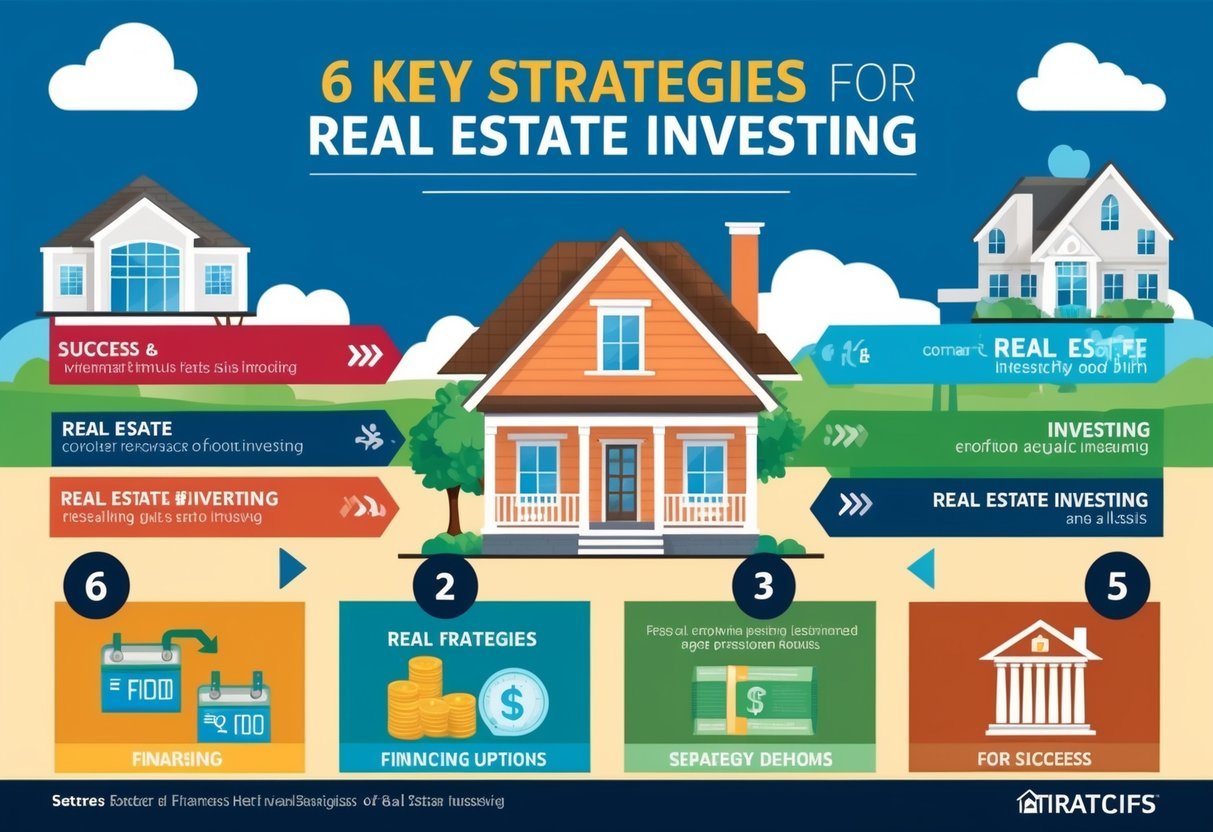Entering the real estate world without prior experience can seem daunting, yet you can do it with the right mindset and strategies.
Real estate offers a range of opportunities, each with its rewards and challenges.
It calls for a blend of strategic planning, learning, and perseverance.
Our aim is to empower you with knowledge so that you can confidently embark on a successful real estate journey even if you’re just starting out. By exploring key strategies and understanding the dynamics of the market, we can help you reduce risks and identify lucrative ventures.
Research Market Trends
To succeed in real estate investing without prior experience, one of the key steps we must take is researching market trends.
Understanding these trends enables us to make informed decisions and identify potential opportunities.
Market dynamics, including supply and demand fluctuations, greatly influence property values and rental yields.
Keeping a close eye on emerging trends helps us recognize shifts that may affect property investments.
We can utilize reports from industry experts, such as those provided by PwC or Forbes, to gain insights into anticipated changes in the market.
Accessing accurate data ensures that we remain updated and prepared to adapt accordingly.
Technological advancements play a significant role in shaping real estate markets today.
It’s essential for us to stay informed about how tools like artificial intelligence influence buying, selling, and property management processes.
Leveraging these technological insights can enhance our ability to navigate the complex market landscape effectively.
Global economic conditions also impact local real estate markets.
Adapting to international trends can provide us with a broader perspective and inform our strategies.
This approach allows us to remain flexible and open to opportunities beyond our immediate area, thus expanding our investment options.
By regularly analyzing market trends, we are better positioned to identify attractive investment opportunities in upcoming neighborhoods.
These areas often present growth potential, offering favorable conditions for maximizing returns.
2) Build a Network
In real estate investing, our network is one of our most valuable assets.
Joining professional organizations and attending related events can introduce us to like-minded individuals.
By engaging with these communities, we cultivate relationships that can offer guidance and support.
We should leverage our personal connections, such as family and friends, who might provide leads or insights.
Our existing contacts can be a great starting point for expanding our professional reach.
Hosting or participating in events like charity fundraisers can connect us with other investors who share our values.
These gatherings facilitate natural interactions and foster stronger bonds within our network.
Active participation in online forums and social media groups focused on real estate investment broadens our access to industry knowledge.
These digital spaces can provide up-to-date information and allow us to connect with experienced investors.
Regular communication with our contacts is crucial to maintaining strong relationships.
By keeping in touch, sharing updates on our activities, and offering assistance, we strengthen our network.
In this industry, connections often lead to opportunities.
By building and nurturing a diverse network, we put ourselves in the best position to hear about investment opportunities and trends early.
3) Leverage Technology
In real estate investing, technology serves as a powerful ally.
We can harness platforms that streamline property searches, offer comprehensive data analytics, and provide virtual tours.
Tools like these simplify our decision-making process and help us identify prime investment opportunities without the need to physically visit each property.
By utilizing data analytics, we gain insights into market trends, property values, and potential returns.
These platforms provide us with detailed information, allowing us to make informed decisions.
Algorithms analyze data to predict future market movements, giving us an advantage in strategic planning.
Virtual tours are increasingly becoming indispensable, allowing us to explore properties from our homes.
This innovation saves us time and resources, ensuring we can efficiently assess multiple options.
Moreover, mobile apps offer functionalities that help us stay connected and manage our investments on the go.
We can track rental incomes, maintenance schedules, and tenant communications, all within a few clicks.
Digital platforms also make automating tasks possible.
From managing finances to tracking payment histories, technology allows us to maintain accuracy and save time.
By leveraging these digital tools, we’re able to operate more efficiently than traditional methods might allow.
Adopting PropTech innovations is crucial for us.
As the industry continues to evolve, staying updated with the latest technology ensures we don’t lag behind in optimizing our investment strategies.
4) Find a Mentor

To navigate the often complex realm of real estate investing, finding a mentor can be invaluable.
A good mentor offers insights drawn from their own experiences, helping us avoid common pitfalls.
They provide guidance on everything from property acquisition to management and financing.
Mentors come in various forms.
We might work one-on-one with a seasoned professional or join a group mentorship program.
Each type offers unique benefits, so we should consider what best fits our style and needs.
To choose the right mentor, we need to look at their track record.
A reputable mentor should have demonstrable success in real estate investing.
It’s not just about their past successes; they should also be a good match for us personally.
Preparing a list of questions before mentorship sessions can help us make the most of each meeting.
This shows our mentor we’re committed and engaged in the learning process.
Our active participation and curiosity can significantly enhance the mentorship experience.
Real estate events and local meetups often serve as excellent places to connect with potential mentors.
Building a genuine relationship takes time, so starting with informal conversations is beneficial.
We can look for someone whose values and approach align with ours.
In our path to becoming successful investors, utilizing the expertise of a mentor can accelerate our learning curve and open doors to new opportunities.
Establishing a rapport with a knowledgeable guide allows us to gain confidence and insight as we progress in the industry.
5) Consider Wholesaling

Wholesaling is an effective strategy for those of us new to real estate investing.
It allows us to enter the market with minimal financial risk.
The process involves securing a property under contract and assigning that contract to another buyer for a profit.
We focus on finding undervalued properties and negotiating favorable terms.
This requires keen negotiation skills and a good understanding of local markets.
We benefit from building a network of other investors who are interested in purchasing these contracts.
A major advantage of wholesaling is that it doesn’t require us to own the property ourselves.
This limits our exposure to the costs associated with holding properties, such as maintenance and taxes.
We can streamline our operations and focus on deal sourcing.
To be successful, we should develop a reliable system for evaluating potential deals.
This might involve creating consistent criteria for property assessment and conducting thorough market research.
By ensuring that the deals we offer provide value, we maintain credibility with our buyers.
Another critical aspect is understanding and executing contracts.
We need to familiarize ourselves with the legalities involved in contract assignment.
Partnering with a knowledgeable real estate attorney could be invaluable for this purpose.
As we gain experience, the potential opportunities in wholesaling can expand.
This could include scaling our operations, exploring new markets, or even branching into other types of real estate investments.
We can leverage the knowledge and skills gained to further our success in the industry.
6) Attend Real Estate Workshops

When embarking on a real estate investment journey, gaining practical insights is crucial.
Attending real estate workshops allows us to learn directly from experienced investors and industry leaders.
These events provide a platform to discuss current market trends, explore innovative strategies, and understand the various aspects of property management.
Workshops often feature interactive sessions, case studies, and networking opportunities, making them invaluable resources.
By engaging with peers and experts, we cultivate a deeper understanding of the field.
This exposure helps us navigate the complexities of real estate investing with greater confidence and competence.
Moreover, workshops offer insights into emerging technologies and market shifts.
We get firsthand knowledge of new tools for investment analysis, property management, and market research.
This knowledge equips us with the ability to make informed decisions based on the most recent industry data.
Regular participation in workshops enhances our ability to identify potential investment opportunities.
The experience helps us differentiate between promising prospects and risky ventures, providing an edge in a competitive market.
Additionally, the relationships we build during these workshops often lead to valuable collaborations and partnerships.
Understanding Real Estate Markets
Grasping the intricacies of real estate markets is crucial for making informed investment decisions, especially for newcomers.
Key elements include basic market analysis techniques and distinguishing between local and national market trends.
Market Analysis Basics
To begin, analyzing a real estate market involves looking at supply and demand, vacancy rates, and historical price trends.
We should focus on key indicators such as median home prices, which provide insights into affordability and potential growth.
Days on Market (DOM) is another significant indicator.
A high DOM may suggest a buyer’s market, while a low DOM could indicate strong demand.
Understanding these metrics helps us gauge the market’s health.
Rental yields and occupancy rates are critical if we’re investing in rental properties.
Analyzing these numbers enables us to forecast cash flow and investment returns.
Placing this data into context with local employment rates and economic growth trends is also important for a comprehensive analysis.
Local vs. National Markets
Local and national markets can exhibit vastly different trends.
Local markets are influenced by specific factors like employment opportunities, population growth, and municipal policies.
For example, a tech boom can make a city attractive for real estate investment.
In contrast, national markets are driven by broader economic policies, interest rates, and national economic trends.
While the national market can offer a big-picture perspective, our focus should often be on local conditions.
Remember, real estate is inherently location-specific.
Thus, while national trends can impact investment dynamics, understanding local nuances allows us to make more targeted decisions that align with specific investment goals.
Analyzing these layers ensures we aren’t swayed solely by macroeconomic factors but also consider local market strength.
Financing Options for New Investors

When you venture into real estate, securing financing is crucial.
Our discussion here highlights conventional loans and alternative financing methods for new investors without extensive experience.
These options can open doors to investment opportunities by providing the capital needed to get started.
Conventional Loans
Conventional loans are a traditional route many new investors consider.
Banks and financial institutions offer these loans, which generally come with competitive interest rates due to their relatively lower risk.
Borrowers often need a good credit score and proof of steady income.
One benefit of conventional loans is the straightforward application process, which many find easier to navigate with proper preparation.
It typically requires a down payment, often around 20%, though some options exist for lower amounts.
We should be aware of potential additional costs, such as private mortgage insurance (PMI), required for those putting down less than 20%.
In summary, conventional loans offer a structured starting point, especially for those with solid financial standing.
Alternative Financing Methods
For new investors seeking flexibility, alternative financing methods might be worth exploring.
These can include options such as crowdfunding, hard money loans, and private money loans.
Each comes with its own set of advantages and challenges.
Crowdfunding allows you to gather small amounts of capital from numerous investors, offering a low-barrier entry point.
Hard money loans are typically short-term and issued by private lenders, ideal for quick transactions but often at higher interest rates.
Private money loans involve borrowing from individual investors, offering more negotiation on terms.
Cross-collateralization, another interesting method, uses existing assets as collateral for new investments.
These alternative methods provide creative pathways to funding real estate investments without the need for traditional bank loans.
Frequently Asked Questions

Navigating the world of real estate investing, especially as a novice, involves understanding the steps to take, choosing the right strategy, and managing risks.
Mastering these elements can set us on a path to success, even with minimal experience.
What are the first steps to take when starting out in real estate investing?
To begin, we should focus on researching market trends and understanding the local real estate environment.
Building a network of like-minded individuals and professionals will provide invaluable support.
Leveraging technology, from property analysis tools to investment apps, can further simplify our journey.
Which real estate investment strategy offers the highest potential returns?
Different strategies cater to varying risk appetites and goals.
Options like wholesaling can offer high potential returns with low upfront investment.
For those willing to hold properties longer, investing in emerging neighborhoods may provide significant growth and tax benefits.
What are the essential factors to evaluate when choosing a real estate investment?
We must assess the location’s growth potential, analyze property conditions, and understand local regulations.
Environmental factors, such as school districts and planned infrastructure developments, also play a crucial role in property valuation.
How can a beginner build a lucrative real estate portfolio with minimal experience?
Starting small with a focus on growth areas can provide gradual gains.
Engaging with a mentor may help navigate complex decisions while embracing opportunities like fix-and-flip can elevate our learning experiences.
Consistent market research remains essential to evolving our portfolio.
What are the critical market indicators a novice real estate investor should monitor?
Keeping an eye on economic indicators such as interest rates, local employment statistics, and housing demand is crucial.
Changes in government policies on housing and urban development can also have a significant impact on investment potential.
How can one effectively manage risk in real estate investments?
We should employ strategies like diversification across property types and locations.
This can help us mitigate unforeseen expenses.
Also, regular property assessments and maintaining a financial buffer are important.
Using reliable property management services can enhance our ability to handle day-to-day challenges effectively.

